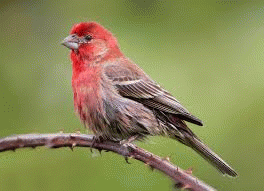
A breeding house finch
(Image by (From Wikimedia) nigel from vancouver, Canada, Author: nigel from vancouver, Canada) Details Source DMCA
Have you noticed this year how the sun comes up in silence? It used to be that these days of sooner and sooner sunrise were greeted by first one then a chorus of brightly singing birds. Every spring, my insomnia was inflamed by the birdsong--I would hear the first one peeling out, followed closely by his compadres--in fact his territorial competitors; something so serious and threatening to the singers expressed so gloriously. I would turn my face to the pillow, hoping for a few more minutes of sleep, almost always in vain. A blindfold shuttered the light while my hearing remained on high alert. But this year, as the first hint of dawn begins and the sky begins to gray, there is no sound. I lost the scapegoat for my sleeplessness.
As I write this on Earth Day I see on the feeder one brown female finch, her eyes darting nervously between a few nips of seed, her rosy-headed mate on a branch out of reach of food several feet away. He never comes closer and soon they both depart--the first finches I've seen in weeks where formerly throngs competed for the perch. Before the stately red-winged blackbirds and the screeching, glassy-eyed grackles returned this month, the seeds in the feeder remained untouched. The small bag of lower-quality feed we bought, hoping to discourage the grackles, has lasted months. I wonder how fare the folks at Wild Birds Unlimited.
Does no one else observe our loss? Searches on 'finches Colorado flood' turn up articles from September of last year, some acknowledging damage to small animals and to fish (who smother in the grit-filled flood waters) while predicting, never fear, their comeback. 'Finches Colorado' nets nothing pertinent; an ornithologist arranges a hike. Finally, I find a forum ('finches disappear Colorado') where HantaYo noted the absence of the brown-capped rosy finches from his feeder. That was the sole acknowledgment I found. Most pay so little heed.
For the absence of our finches I have a theory. Of course the flood following 17 inches of rain last fall must be involved. But how? The week of wet we had in our semi-arid land was unprecedented. For birds not genetically adapted, extended rain overcomes the waterproofing of their feathers. Birds so unprotected lose their body heat and, even in the relatively mild temperatures of autumn, are felled by hypothermia.
There's a second part to my theory. If all those finches died, what happened to their bodies? Of course, when they feel death coming on wild animals tend to secrete themselves away. But we had hordes of finches, and I never saw a body.
Here in east Boulder city squirrels also compete for that bird feeder. It was late November last winter when we noticed that the squirrels were fat--not just pudgy in preparation for winter, but frankly fat, fatter than I'd ever seen a squirrel. Somehow they were getting a surfeit of food. Would squirrels consume bird bodies? I consulted Google. Apparently squirrels can and do eat meat when it's available, and they don't even have to be starving. Stephen Beehler from Emory University put on YouTube this unsettling video of a supposedly vegetarian city squirrel methodically eating a bird.When the opportunity arose, squirrels feasted. My theory could be argued, but still the birds are gone.
Now, in the early dawn, it's my own insomnia and not birdsong that wakes me. I never knew it was only finches that comprised that vanished chorus. If these were normal times, we could confidently expect their return. But these are not normal times. It was a thousand-year rain that undid our finches. Normal times are bygone; we have lost our chance to learn.
Jackie Dial lives by a birdfeeder in Boulder.





